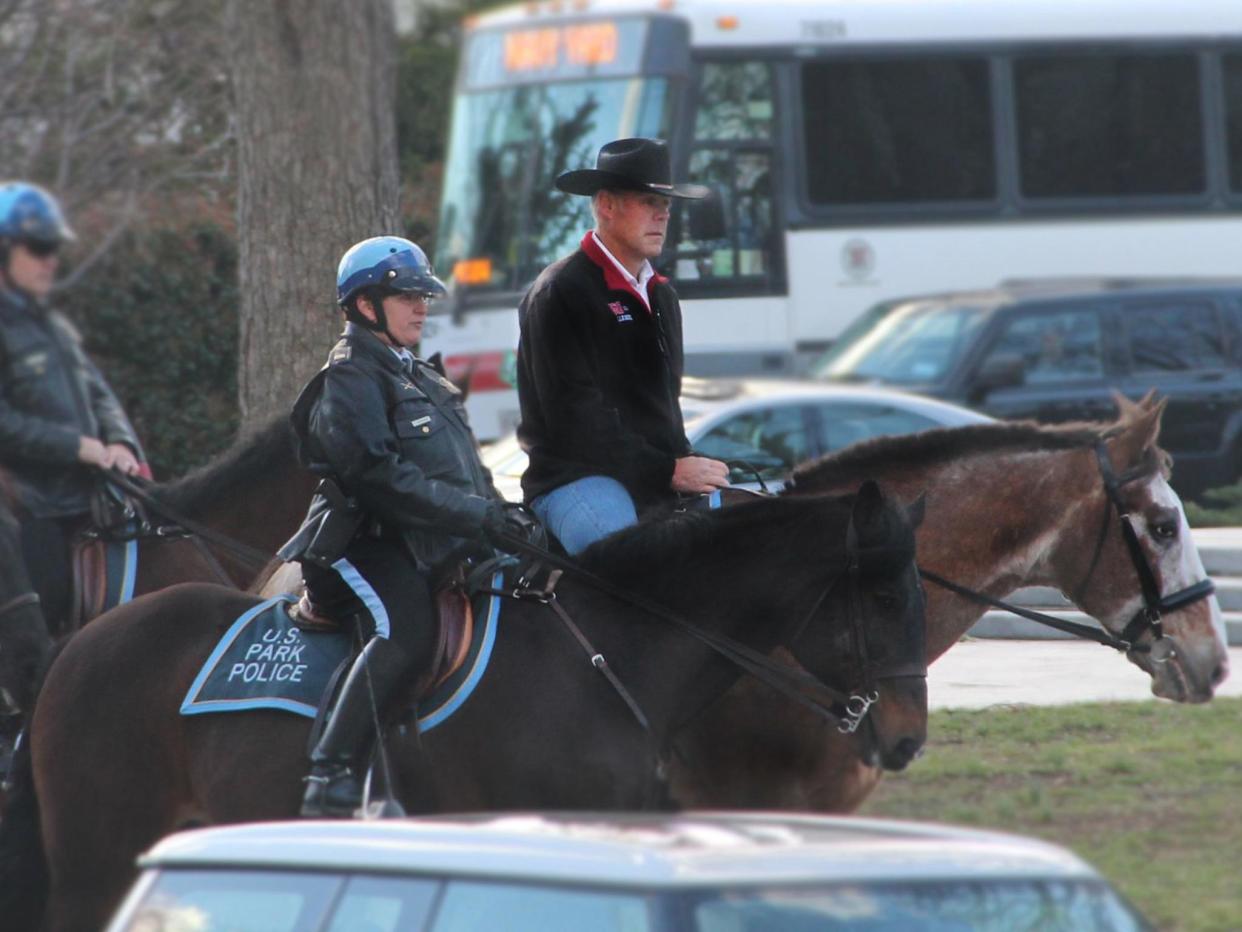Ryan Zinke: Donald Trump's new Secretary of the Interior rode a horse to work on his first day

Donald Trump's new secretary of the interior rode a horse to work on his first day in the job.
Ryan Zinke, a keen outdoorsman and a former Navy SEAL, was confirmed by the Senate on Wednesday.
He arrived for his first day in charge of a fifth of the United States' surface land — to say nothing of natural resources below ground—with serious swagger, wearing a cowboy hat and blue jeans, in the saddle of a tall brown horse.
“Honored to stand with the brave officers of @USParkPolice - these professionals put their lives on the line for us,” he tweeted, after posing for photographs.
“Let's get to work,” he added, according to the Bureau of Safety and Environmental Enforcement.
Mr Zinke's portfolio will include overseeing the US' national parks and natural resources like gas, oil and timber, as well as managing land and services for Native American tribes.
He praised his new boss as a “great president and a commander in chief I will fight with.”
Mr Zinke is the 16th of 22 of Mr Trump's cabinet and cabinet-level nominations to win Senate approval. Ben Carson, his choice to lead the Department of Housing and Urban Development, cleared a Senate hurdle by a vote of 62 to 37. Mr Carson's confirmation was expected later this week.
The 55-year-old former Montana congressman resigned as a delegate to the Republican National Convention last year to protest the GOP's position in favour of land transfers to state or private groups.
Still, his stance on public lands has come into question in recent weeks after he voted in favour of a House rule that would allow federal land transfers to be considered cost-free and budget-neutral, making it easier for drilling and development.
Senate minority leader Chuck Schumer said Mr Zinke at Interior should “concern every lover of our great and grand national parks.”
Dismissing the Republican's claim to be like President Teddy Roosevelt, Mr Schumer said: “You can't be a Roosevelt conservationist if you sell off public lands.”
Countering the Democrat, Montana Republican Senator Steve Daines said Mr Zinke “will be a strong advocate for our public lands.”
Mr Zinke, who recently began his second term as Montana's sole House member, told senators at a January hearing that federal land management should be done under a multiple-use model that allows hiking, hunting, fishing and camping along with harvesting timber, mining for coal and drilling for oil and natural gas.
He also pledged to tackle an estimated $12bn (£9.8bn) backlog in maintenance and repair at national parks and stand firm against attempts to sell, give away or transfer federal lands.
Senator Maria Cantwell of Washington state, the top Democrat on the Senate Energy and Natural Resources Committee, said she is not convinced that Mr Zinke will be able to “stand up” to Mr Trump and prevent oil, gas and mining companies from unduly exploiting public lands.
Ms Cantwell also said Mr Zinke appears willing to support transfer of some federal lands to states, citing his vote for the GOP-sponsored rules package. She worries that Mr Zinke may weaken or repeal recent designations by President Barack Obama of national monuments, including Utah's Bears Ears monument.
Senate Energy Chairwoman Lisa Murkowski of Alaska called Mr Zinke an excellent choice, noting that the fifth-generation Montanan is an avid hunter, fisherman and skier.
“He was born in the West. He lives in the West. He understands it, he understands its people,” Ms Murkowski said.
Mr Zinke also has “firsthand experience in trying to solve” problems faced by the Interior Department and has “shown he understands the need for the department to be a partner of Alaska and our Western states,” Ms Murkowski said.
During his hearing, Mr Zinke rejected Mr Trump's claim that climate change is a hoax, saying it is indisputable that environmental changes are affecting the world's temperature and human activity is a major reason.
“I think where there's debate is what that (human) influence is and what can we do about it,” he said.
Mr Zinke also pledged to work with members of Congress on monument designations, noting the strong opposition to Bears Ears by Utah's congressional delegation and governor.
“I think the state should have a say on it,” he said.
Additional reporting by agencies

